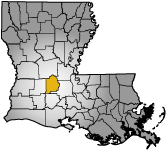SECTION: 614 FIELD INTERVIEW
SECTION: 614
TITLE: FIELD INTERVIEW
RESCIND: February 15, 2017
EFFECTIVE: JUNE 30, 2025
SECTION_614_FIELD_INTERVIEW.docx
PURPOSE
This policy establishes guidelines for the utilization of field interviews.
POLICY
It shall be the policy of the Evangeline Parish Sheriff's Department to encourage the use of field interviews, a valid investigative tool which prevents potential violators from committing a criminal act. It shall also be the policy that these interviews be conducted under the parameters of State and Federal Law.
AUTHORITY TO STOP AND FRISK
Article 215.1 of the Louisiana Code of Criminal Procedure gives an officer the authority to conduct an investigative detention and a self-protective search for weapons.
Article 215.1 - Temporary questioning of persons in public places; frisk for weapons states:
- A law enforcement officer may STOP a person in a public place whom he reasonably suspects is committing, has committed or is about to commit an offense and may demand of him his name, address and an explanation of his actions.
- When a law enforcement officer has stopped a person for questioning pursuant to this Article and reasonably suspects that he is in danger, he may frisk the outer clothing of such person for a dangerous weapon. If the law enforcement officer reasonably suspects the person possesses a dangerous weapon, he may search the person.
- If the law enforcement officer finds a dangerous weapon, he may take and keep it until the completion of the questioning, at which time he shall either return it, if lawfully possessed or arrest such person.
OBSERVATION OF SUSPICIOUS ACTIVITY
A deputy may confront a person when he reasonably suspects that the person has committed, is committing or is about to commit a crime. Reasonable suspicion is more than a "hunch" but less than evidence amounting to probable cause to believe that a person has been, is or is about to become involved in a crime.
The following circumstances may be considered by the deputy in determining whether reasonable suspicion exists to justify a stop. (List is not all inclusive)
- The actions, appearance or demeanor of the person.
- Clothing of the person, including suspicious bulges through the clothing or objects carried.
- The hour
- Deputy's knowledge of information relating to the person.
- Inappropriateness of the presence of persons/vehicles in a given location. (Example: unmarked van backed up to a loading dock at night with business darkened.
THE STOP
When suspicious activity is noted, Deputies shall, using accepted patrol techniques, confront such activity. A deputy shall identify himself as a law enforcement officer and inquiries shall be reasonable. Suspicious persons will be interviewed to determine:
- Identity
- Reason for presence
- Complicity of illegal activities
A deputy shall not detain a suspect for any longer than is absolutely necessary. The reasonableness of the duration of the stop depends on the facts and circumstances of each particular case.
A deputy shall not move the suspect away from the immediate area of the stop. The suspect may, however, be moved to a nearby area for safety reasons or to a nearby unit so the deputy may communicate with his office on matters pertinent to the stop.
The deputy shall determine if the contact warrants documentation, and if so, shall complete a Field Interview Report.
THE FRISK
When a deputy has knowledge or information sufficient to justify a reasonable fear that the person he has stopped is presently armed and dangerous, he may frisk him.
The purpose of the frisk is to protect the deputy by discovering concealed weapons. The frisk shall be limited to a patting down of the outside of a subject's clothing solely to determine if he is carrying a weapon. If, in patting down a person the deputy feels an object he believes to be a weapon, he may search in or under the subjects clothing. Items found as a result of this search for a weapon may be used as evidence against the subject.
The following guidelines might support the reasonable conclusion that the suspect may be armed:
- The nature of the criminal activity under investigation, such as armed robbery, murder, or any offense in which a weapon would likely be used.
- Observation of furtive behavior, such as the suspect reaching under the seat of his car or a movement toward his armpit, belt line or ankle/foot area where pistols are usually concealed.
- The deputy's observation of a bulge under the suspect's clothing or an unusual appearance of the suspect's clothing indicative of the presence of a weapon.
- The deputy's knowledge of the suspect's criminal record or reputation for carrying a concealed weapon.
- The time of day
- Recent incidents of violence in the area of the stop.
- Number of suspects in relation to the number of deputies
- Age, sex, physical condition and demeanor of the person(s) being questioned.
- Information from a source which the deputy has reason to believe is reliable and credible that the suspect may be armed.
If the object found in the course of the frisk is a dangerous weapon prohibited by law, the deputy may arrest the person. Incidental to arrest, the deputy may make a search of the arrestee and his immediate surroundings and seize contraband, evidence or fruits of a crime.
If the frisk fails to detect a weapon, the deputy shall cease any further search of the person or his clothing. Items found as a result of a more extensive search shall not be admissible as evidence.
In regards to: All Rules, Regulations, Policy & Procedures and Special Orders are at the discretion of the Sheriff based on departmental need and the severity of the infraction.



